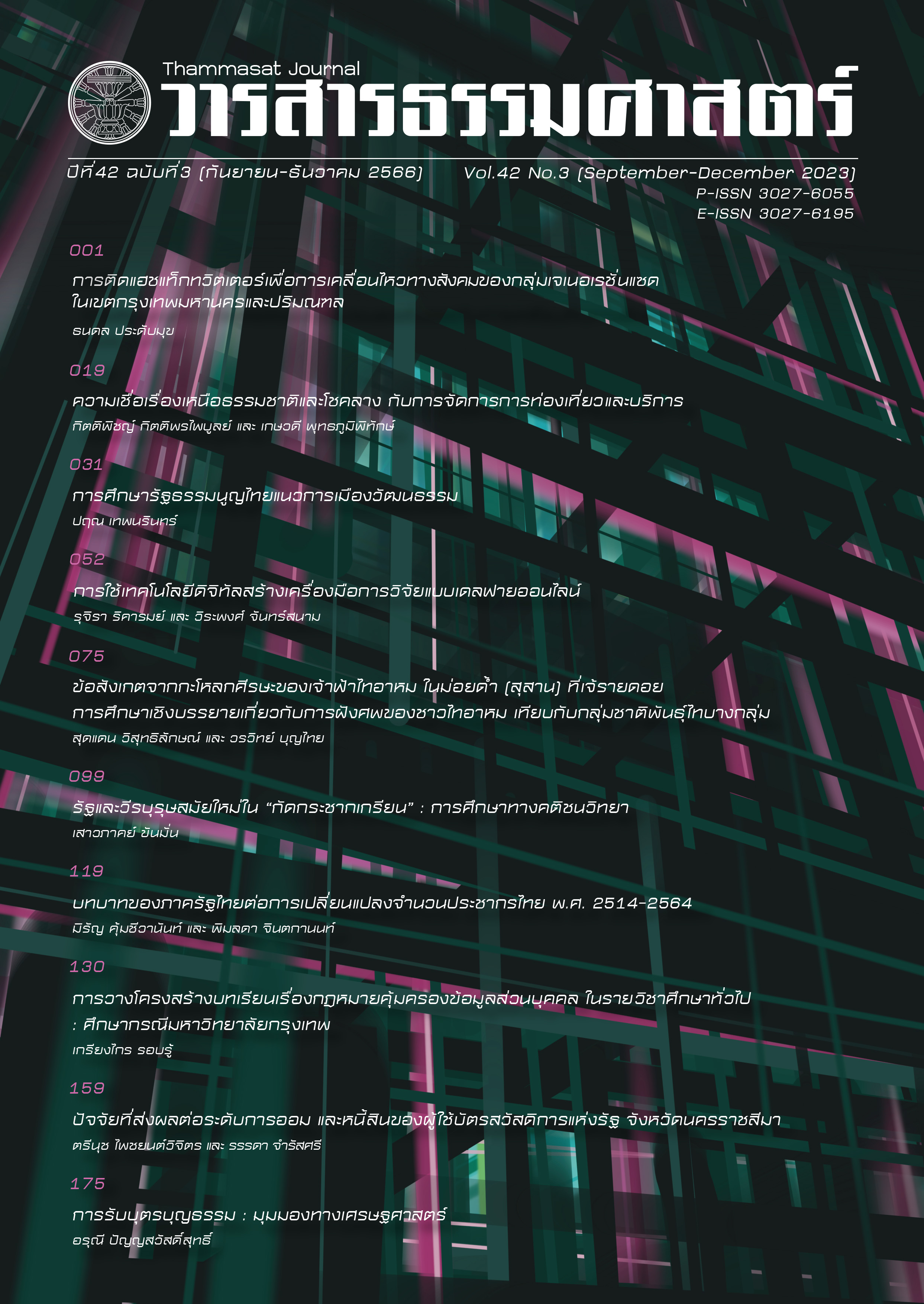The State and the Modern Heroes in “Zombie Fighter”: A Folkloristic Study
Main Article Content
Abstract
This article studies and applies Joseph Campbell’s ideas in “The Adventure of the Hero” to “Zombie Fighter”, a Thai film by Poj Arnon, to demonstrate and analyze the idea of hero in the film and to analyze the reflection and the role of the state amidst the emergency situation through “soldiers” characters in the film. The study finds that the film reflects the universal shared ideas of hero especially the model of the Adventure of the Hero coined by Campbell. The formula represented in rites of passage is also used in the film: separation-initiation-return. The heroes leave their home to the mythical land to go through trials or learn essential
information and then they return to their home. Therefore, the boy characters in the film go over their childhood state and become adolescents by learning the identity of family protectors. The soldier characters in the film reflect the failure of the state’s administrative role since their policy on zombie’s control resulted in the death of both their people and the soldiers themselves: soldiers and the state become the zombie themselves. This failure connotes the failure of military ideology and the failure of the nation ideology. The film’s heroes are no longer reflecting the nation-heroes but self-heroes. The heroes are not required to do a great deed or a nation-favoured deed: the ordinary people are also heroes.
Article Details
References
กฤตยา ณ หนองคาย. (2556). พระเอกและผู้ร้ายในภาพยนตร์แนวต่อสู้ผจญภัยของไทย: การวิเคราะห์ลักษณะการผสมผสานทางวัฒนธรรม. [วิทยานิพนธ์ปริญญาอักษรศาสตรดุษฎีบัณฑิต สาขาวิชาภาษาไทย ภาควิชาภาษาไทย]. จุฬาลงกรณ์มหาวิทยาลัย.
ชนัญญา ประสาทไทย. (2559). ซอมบี้ไทย สังคมไทย และการเมืองไทย. [วิทยานิพนธ์สังคมวิทยาและมานุษยวิทยามหาบัณฑิต สาขาวิชาการวิจัยทางสังคม คณะสังคมวิทยาและมานุษยวิทยา].มหาวิทยาลัยธรรมศาสตร์.
ธนภัทร พิริย์โยธินกุล. (2564). พินิจความเป็น "วีรบุรุษ" ของ "เซเลอร์มูน" ในการ์ตูนฉบับมังงะผ่านแว่นคติชนวิทยา. วารสารศิลปศาสตร์ มหาวิทยาลัยมหิดล, 4(1), 167 - 217.
พรชิตา ประเสริฐดี และสุกัญญาโสภี ใจกล่ำ. (2564). การผจญภัยของรายาและมังกรตัวสุดท้ายตามแนวคิดของคริสโตเฟอร์ โวกเลอร์. วารสารวิชาการมนุษยศาสตร์และสังคมศาสตร์รำไพพรรณี,2(2), 32 - 43.
วริศรา อนันตโท. (2559). จามเทวีบูชา: การผลิตซ้ำและการสร้างพิธีบวงสรวงในสังคมไทยร่วมสมัย. [วิทยานิพนธ์ปริญญาอักษรศาสตรดุษฎีบัณฑิต สาขาวิชาภาษาไทย ภาควิชาภาษาไทย]. จุฬาลงกรณ์มหาวิทยาลัย.
สุกัญญาโสภี ใจกล่ำ. (2564). โฟรเซ่น 2: การเดินทางของวีรบุรุษจากเทพปกรณัมสู่ภาพยนตร์กับมุมมองทางคติชนวิทยา. วารสารวิจัยราชภัฏพระนคร สาขามนุษยศาสตร์และสังคมศาสตร์, 16(2), 72-86.
สายป่าน ปุริวรรณชนะ. (2555). อิทธิปาฏิหาริย์กับการสร้างเรื่องเล่าศักดิ์สิทธิ์: ขนบนิยมและพลวัตในประวัติพระเกจิอาจารย์ในสังคมไทยภาคกลาง. [วิทยานิพนธ์ปริญญาอักษรศาสตรดุษฎีบัณฑิต สาขาวิชาภาษาไทย ภาควิชาภาษาไทย]. จุฬาลงกรณ์มหาวิทยาลัย.
อภิลักษณ์ เกษมผลกูล. (2552.) ตำนานพระศรีอาริย์ในสังคมไทย: การสร้างสรรค์และบทบาท. [วิทยานิพนธ์ปริญญาอักษรศาสตรดุษฎีบัณฑิต สาขาวิชาภาษาไทย ภาควิชาภาษาไทย]. จุฬาลงกรณ์มหาวิทยาลัย.
Campbell, Joseph. (2004). The Hero with A Thousand Faces. (Commemorative Edition). New Jersey: Princeton University Press.
Vogler, Christopher. (2007). The Writer’s Journey. (Third Edition). CA: Michael Wiese Productions.
Voytilla, Stuart. (1999). Myth and the Movies: Discovering the Mythic Structure of 50 Unforgettable Films. CA: Michael Wiese Productions.

